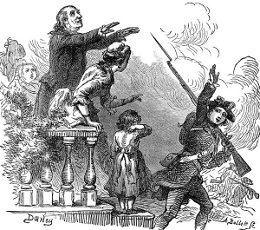DNC Chair: Personhood Amendment Is ‘Extreme and Radical’
Body
Debbie Wasserman-Schultz (D-Fla.) said Thursday legislators in states such as Mississippi, Ohio and Texas are taking “an extreme and radical step” by proclaiming that life begins at conception. She also called the personhood amendment “divisive” and “dangerous.”

 Something doesn’t add up. We refer to July 4 as Independence Day. We refer to the war that followed as the Revolutionary War. But if we viewed ourselves as independent of British rule on July 4, how could we have engaged in revolution after July 4? Revolution normally precedes independence. Either the day or the war is a misnomer.
Something doesn’t add up. We refer to July 4 as Independence Day. We refer to the war that followed as the Revolutionary War. But if we viewed ourselves as independent of British rule on July 4, how could we have engaged in revolution after July 4? Revolution normally precedes independence. Either the day or the war is a misnomer.

Discussion